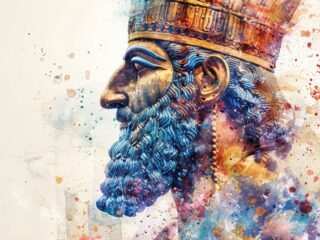Sarah is a high school senior who is passionate about Christ but wonders if she’ll lose her faith by studying science in college.
Graham is a college student who loves Jesus and is struggling to discern how to love his gay friends with compassion and integrity.
Madison’s grandfather was recently diagnosed with dementia and she’s struggling to make sense of “losing him” already, even while he’s living in the nursing home.
The doctrine of Imago Dei, or “the image of God,” is the missing link in the above scenarios. It addresses what it means for people to be created in God’s image and what it means for Christians to be conformed to Christ. When Christians overlook this message, they’ll struggle to integrate their Christian faith with “real life.” For example, Sarah would benefit from seeing how science flows from our God-given call to cultivate and care for creation; and Graham will be encouraged to remember his calling to embody God’s glory and goodness towards his gay friends in a way that genuinely loves them while calling them to embrace God’s created design for sexuality and fulfillment; and Madison finds great comfort in recognizing God’s image in her grandfather, even though he no longer resembles the man she once knew.
One of the reasons Christians often struggle to integrate their faith into daily life is that they sometimes miss the connection between who they are (identity) with what they are (image bearers). Another way of putting this is to talk about both being God’s image (what we are) and bearing God’s image (how we live). Even though our culture is filled with conversations about “Who am I?”, we may not be not asking the more foundational question: “What am I?” Understanding the Imago Dei enables Christians to be and bear God’s image faithfully in their world.
Not only does the image of God help youth and young adults discover their identity in Christ, it directly addresses the root question behind each of the most controversial issues in our culture today: sexuality and gender, racism, abortion, and more. When we understand that we have been created to bear God’s image in this world, it gives clarity to our purpose and provides a context for engaging questions of how we treat one another, who has authority over our lives, and how to build God-honoring relationships. Without this foundation, unpopular Christian teachings seem like little more than one person’s opinion against everyone else’s.
Implications for Imago Dei
What does it mean to bear God’s image? If this concept refers primarily to human rationality, we would then question the status of the mentally disabled. Similarly, if the imago Dei is about morality and living in a way that accurately reflects God’s goodness, then it would be reasonable to conclude the wicked do not bear God’s image. Neither of these ideas are taught in Scripture. Instead, Psalm 8:5 says that God created humanity “a little lower than the angels, and crowned them with glory and honor” without any qualification about the corruption of sin or brokenness.
The image of God is innate to every human: “So God created mankind in his own image, in the image of God he created them; male and female he created them.” (Genesis 1:27) God created humanity to bear his image in the world as living icons of his glory and goodness. Sin has not broken or shattered the image of God within us, but it has warped us so we cannot innately bear his image in a way that faithfully reflects him. Left to our own devises, we twist our God-given dignity into something we manipulate for our own glory and we live according to our own definitions of goodness.
Bearing God’s image, or “being iconic”, isn’t merely something we do. Being God’s image is also what we are as human beings. This is why the vilest sinner continues to bear God’s image and is worthy of dignity and honor. It’s also why men and women with Alzheimer’s or who are severely disabled continue to bear God’s image just as much as those who are healthy.
A Biblical Vision for Human Flourishing
In what is known as the creation mandate, God told his image-bearers to “be fruitful and increase in number; fill the earth and subdue it” (Genesis 1:28). We are God’s representatives who rule over creation in a way that fills it with living icons of his glory and goodness. Embodying God’s righteousness, creativity, love, and other attributes is an expression of this God-given calling, whether through farming, scientific research, engineering, artistic expression, or a wide array of other endeavors. We are called to rule the earth in a way that leads to flourishing.
The gospel is so much more than “how to be saved.” It’s the proclamation of new life in Christ Jesus, the very one in whose image we were created. Sanctification is nothing less than being conformed to the image of Christ (Romans 8:29). This is why the Imago Dei is so important for discipleship: it clarifies the believer’s relationship with the broader world with gospel-driven clarity. Sarah can study science with curiosity and awe because she wants to fulfill the creation mandate, Graham can love fellow image-bearers with truth and love that prompts them to behold God’s beautiful design for humanity, and Madison can celebrate ongoing glimpses of her grandfather’s innate glory. The Imago Dei enriches every aspect of the believer’s life.
When Christians embrace their identity as God’s image-bearer, they discover what it means to embody God’s glory and goodness in every area of life. This is especially important for youth and young adults who are in the throes of identity-formation. By teaching them what it means to be iconic, we aren’t merely helping them answer “Who am I?” but “What am I?”
The imago Dei isn’t merely an academic idea—it’s at the very heart of discipleship. When youth and young adults understand what they are, then they’re better prepared to discover who they are in Christ and how to be God’s image in their world.
Iconic: Being God’s Image in Your World
God created us to be his image-bearers, as icons who remind the world of his majesty and nature. When we discover our purpose in his big story, it helps us make sense of our individual stories. In Iconic, you will see how being and bearing God’s image helps you discover your own identity as a loved child of God and shapes your relationship with him, others, and yourself.







